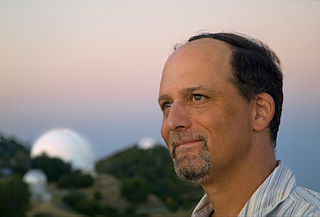A Quote by Seth Shostak
[O]ne might ask why, in a galaxy of a few hundred billion stars, the aliens are so intent on coming to Earth at all. It would be as if every vertebrate in North America somehow felt drawn to a particular house in Peoria, Illinois. Are we really that interesting?
Related Quotes
For all we know, the aliens have already done this and unwittingly concluded that there was no intelligent life on Earth. They would now be looking elsewhere. A more humbling possibility would be if aliens had become aware of the technologically proficient species that now inhabits Earth, yet they had drawn the same conclusion.
You know; when I look at the night sky and I see this enormous splendor of stars and galaxies, I sometimes ask the question, well how many worlds are we talking about? Well do the math, there are about 100 billion galaxies that are in the visible universe and each galaxy in turn contains about 100 billion stars, you multiply and you get about ten billion trillion stars. Well I think it is the height of arrogance to believe that we are alone in the universe, my attitude is that the universe is teaming, teaming with different kinds of life forms
Chances are, the aliens will not want to land on our backyard, or even the White House lawn, with their flying saucers. They may have tiny, robotic self-replicating probes which can reach near light speed and can proliferate around the galaxy. So instead of the Enterprise and huge star ships, the aliens might actually send tiny probes to explore the universe. One might land on our lawn and we won't even know.
Imagine the earth’s population of six billion people reduced to just one hundred representatives. Statistically, that makes 30 white, 70 non-white. It means 6 people own 59% of the wealth and they all live in North America. 80 are in substandard housing. One has an education. One owns a computer. Don’t blame me if it all sounds crazy.
I never said it. Honest. Oh, I said there are maybe 100 billion galaxies and 10 billion trillion stars. It's hard to talk about the Cosmos without using big numbers. I said "billion" many times on the Cosmos television series, which was seen by a great many people. But I never said "billions and billions." For one thing, it's too imprecise. How many billions are "billions and billions"? A few billion? Twenty billion? A hundred billion? "Billions and billions" is pretty vague. When we reconfigured and updated the series, I checked-and sure enough, I never said it.
That's the nature of representation; every time we represent something we alter it and slightly change it. And so with that as my foundation, understanding that it's always fictional to some degree, I give myself a certain freedom to really explore and ask myself questions. What might not have been understood at that time? What might have been hidden at that time? What narrative in this particular image wasn't the primary image, but is really important? That is really interesting to me, and then I try to tease that out as much as I can.
Steven Soderbergh really likes Irréversible, that's about all I can tell you. About the making, well, it was a very particular situation, because those people all know each other, and they're all big stars. I felt like the little French guy, really. And I was very flattered to be called on that, of course, but I felt like if I didn't find something to be a little original, different, particular in the movie, I would just disappear.

































